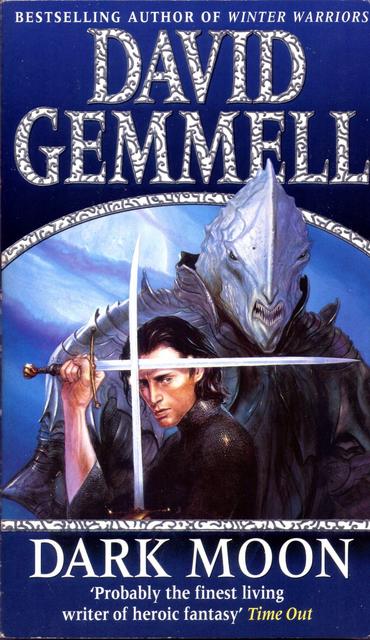|
|
Post by cromagnonman on Jun 17, 2016 16:29:35 GMT
  On the 28th of July this year it will be ten years to the day since heroic fantasy lost its greatest modern exponent with the death of David Gemmell. In the intervening decade no one has ever succeeded in filling the creative void he left behind though not for wont of pretenders attempting to do so. Gemmell was far from being an inimitable writer: he tended to work with a limited range of set ups and scenarios and favoured a sparse palette when it came to character types. That said, within these self-imposed parameters there was no one better at wringing out the last drop of pathos and poignancy from the heroic tragedies of his narratives. And they are invariably tragedies. Because even though Gemmell celebrated the triumph of human courage, endeavour and perseverence in all his work it was rarely achieved without terrible cost to his heroes (and heroines). Gemmell was no dew-eyed fabulist and never shied away from addressing the price of true heroism. I could have chosen any book of his to mark this solemn anniversary. Any title is guaranteed to provide an enthralling, exciting and captivating read. DARK MOON was simply the first book that came to hand. Its selection however could hardly have been more apposite seeing as how it is a book with its own anniversary to celebrate this year having been first published in 1996. This is one of Gemmell's comparitively uncommon standalone novels, outside of the more prevalent Drenai and Rigante series. The basic premise of DARK MOON concerns a land once occupied by three distinct races: the pacifistic Oltor, the gently sagacious Eldarin and the savage Daroth. In the millenium preceeding the book's commencement the Daroth had succeeded in exterminating the Oltor and had themselves been imprisoned - albeit reluctantly - by the non-interventionist Eldarin in a black bubble of sorcery maintained by an ancient artifact called the Eldarin Pearl. As the book opens it is now humans that hold sway on this magic rich world, and in the course of a brutal feudal struggle called the War of the Four Duchies the ambitious sorceror Duke Sirano destroys the binding magic of the Pearl and releases the murderous Daroth back upon the world. Once there, with their appetite for salt, they quickly discover a rich new delicacy in human flesh. As is commonly the case in Gemmell novels it is left to three heroes to save the day: the warrior woman and strategist Karis, the Eldarin fostered harpist and healer Duvodas, and Tarantio, the deadliest swordsman of the age. Each of these characters proves to be a compelling companion to navigate the book's 400+ pages with; although Duvodas's moonstruck decency could prove a little tiresome for some without the counterpoint of Karis's bed-hopping and Tarantio's psychological traumas to put it into context. Tarantio, especially, is a great character, and one of the chief joys of the book is the internal conversations he holds with a cynical and bloodthirsty personage called Dace with whom he timeshares his mind and who takes complete control of his body in times of stress. Tarantio is a good soldier but when possessed by Dace he becomes a juggernaut of destruction. A lesser writer would have explained Dace away as a possessing demon but Gemmell was far too adept a storyteller to follow such a lazy course. He makes it abundantly clear that Dace is a warped constructed facet of Tarantio's own personality created out of a childhood trauma. It is a pity that despite dominating the early portions of the book Tarantio becomes marginalised later on as the narratives of Karis and Duvodas begin to take precedence. But that is about the only serious complaint I can make about this marvellous book. It is a terrific read, albeit not one that I would necessarily recommend to anyone not already well acquainted with Gemmell's work. It is noticeably lighter on the action scenes in which he always excelled and in flourishes of outright fantasy than some of his earlier novels. That is not to say it doesn't have a full quota of bloodletting and swordplay. The climactic siege of the city of Corduin - one of the signature features of Gemmell's work - is characteristically splendid. But anyone not intimate with Gemmell's output could - conceivably - find it a little on the slow side owing to its concern for character development. This isn't limited just to the three protagonists either. All of the supporting cast are adroitly sketched in, from the emotionally constipated Duke Albreck to the simple Brune, the jealous swordsman Vint to the lovelorn Forin. All of this effort pays dividends in the investment the reader makes in the eventual fates of these characters. And faced with the pitiless threat posed by the awesome Daroth these fates hang by tenous threads indeed. Despite enjoying huge sales Gemmell was never accorded the critical acclaim his work merited. His own feelings on the matter are, perhaps, best summed up by the rueful aphorism he puts here into the mouth of the inventor Ozhobar: "Well, boy, the world is ruled by fools so that other fools might prosper. Men of imagination are not highly regarded, as I fear you will find."
Let me encourage everyone to crack open a bottle in his honour and a paperback in his memory and salute the life and legacy of the mighty Gemmell. Truly heroic fantasy will never see his like again. ![]() |
|
